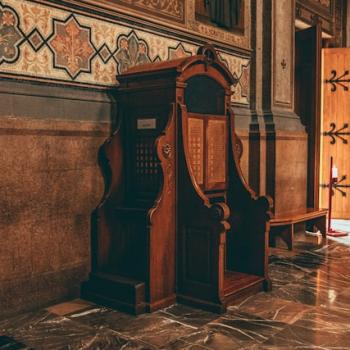Paul, in describing the divisions in the Corinthian community, warns them to come together, right now, over Christ, and not to be lost in identification with Christian leaders. Each teacher lauded by the Corinthian community has something to offer, but, Paul writes, each is answerable to God for their behavior:
According to the grace of God given to me, like a skilled master builder I laid a foundation, and another man is building upon it. Let each man take care how he builds upon it. For no other foundation can any one lay than that which is laid, which is Jesus Christ. Now if any one builds on the foundation with gold, silver, precious stones, wood, hay, straw—each man's work will become manifest; for the Day will disclose it, because it will be revealed with fire, and the fire will test what sort of work each one has done. If the work which any man has built on the foundation survives, he will receive a reward. If any man's work is burned up, he will suffer loss, though he himself will be saved, but only as through fire. (1 Corinthians 3:10-15)
This seems like an eschatological "process" in this case, but not one that leads to damnation. The "fire" which burns is a purifying, refining fire, which might lead to "loss, though he himself will be saved, but only as through fire." This, to my mind, is purgation (cf. CCC 1031). First Peter 1:6-7 also speaks of being purified by fire, but in the case of Peter, it seems that the trials are taking place presently: "In this you rejoice, though now for a little while you may have to suffer various trials, so that the genuineness of your faith, more precious than gold which though perishable is tested by fire, may redound to praise and glory and honor at the revelation of Jesus Christ." It is of this, too, that the pope spoke, when he spoke of the "interior fire" that St. Catherine felt as a purification for her previous sins. These pangs of torment are familiar to many people, not as a means of "beating oneself up," but as a means of genuine repentance for actions done poorly.
It is this kind of experience of conversion that Paul may be speaking of in Romans 12:17-21:
Repay no one evil for evil, but take thought for what is noble in the sight of all. If possible, so far as it depends upon you, live peaceably with all. Beloved, never avenge yourselves, but leave it to the wrath of God; for it is written, "Vengeance is mine, I will repay, says the Lord." No, "if your enemy is hungry, feed him; if he is thirsty, give him drink; for by so doing you will heap burning coals upon his head." Do not be overcome by evil, but overcome evil with good.
The Church fathers and scholars today have debated what Paul means by saying that when we forego vengeance "burning coals" are heaped upon someone's head. Some ancient writers opted for "burning coals" as a sign of God's punishment, while others suggested they were the burning pangs of conversion. Is it possible that what we have here is the process of purgation, in which the "enemy" is confronted by their own deeds and must make account of them, whether the coals would lead to immediate conversion or later repentance? I see the coals of fire not as eschatological punishment, but as the process of purgation, either now or at the end of time.
Romans 12:17-21 does not appear in the CCC in the discussion of purgatory and neither does this next passage, The Parable of the Unforgiving Debtor, in Matthew 18:21-35. In this passage a King forgives his slave a massive debt, but the same forgiven slave refuses to forgive the much smaller debt of a fellow slave. The unforgiving slave is taken to task:
"You wicked slave! I forgave you all that debt because you pleaded with me. Should you not have had mercy on your fellow slave, as I had mercy on you?" And in anger his lord handed him over to be tortured until he would pay his entire debt. So my heavenly Father will also do to every one of you, if you do not forgive your brother or sister from your heart. (Matthew 18:32-35)
This passage is significant with respect to a process of purgation. The unforgiving slave is not cast aside eternally, but paying off a debt in torment, which, though it is huge, has an end. This cannot be hell. When Matthew speaks of hell, he uses particular language, in which a person is thrown "into the outer darkness, where there will be weeping and gnashing of teeth." Matthew uses this language on six occasions in his Gospel; it appears on one occasion in Luke 13:28.
The process of purgation is necessary. Why? For one, because it appears in the scriptural record, and so it is necessary to accept and understand the concept; but more than that because it is necessary for us in our preparation to achieve the goal for which we are all called: to see God face to face. Those of us far from perfection might as well start the process of purification now. I know, I know, it burns, doesn't it?




